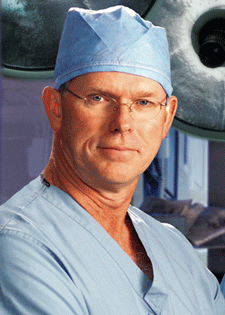Adam's Heart Valve Surgery Blog – Page 74
Mitral Valve Leakage And Stress
By Adam Pick on March 21, 2008
My inbox is filling up with some very interesting questions. I just received a question that reads, “Is stress a symptom of mitral valve leakage?”

As I’ve written before, there are several leaking heart valve symptoms identified by leading heart care facilities including The Cleveland Clinic and The Mayo Clinic. (Please click here to view those symptoms.)
However, from my own research, I have not seen any clinical studies which suggest that mitral valve leakage is directly related to stress (as a symptom). However, as a former patient, I could very easily see how being diagnosed with mitral valve leakage creates stress.
If you have any, extra information on this topic of stress and mitral valve leakage, please help out and leave a reply below.
Keep on tickin!
Adam
“My Momma Always Said… Valve Surgery Is Like A Box Of Chocolates.”
By Adam Pick on March 12, 2008
Yes, Forrest Gump is one of my favorite movies.
That said, I had to borrow that famous line for this very rare patient story about Brad Mueller. In case you can’t remember the complete movie quote, Forrest Gump said in the movie, “My momma always said life was a like a box of chocolates. Ya never know what you’re gonna get.”

Brad and I started emailing each other a few months ago. Brad had read my book and had some additional questions about stamina after heart valve replacement.
On February 29, Brad went in for an aortic valve replacement. Brad’s surgeon was Dr. John Oswalt from Austin, Texas. Like me, Brad had a bicuspid aortic valve with an erosion due to endocarditis. Over time, the endocarditis had severely compromised the integrity of the aortic valve.
Heart Valve Replacement Surgery – How Successful Is It?
By Adam Pick on March 10, 2008
I just received a great question via email. In fact, this particular question brought back memories to when I was first diagnosed with severe aortic stenosis and told that I needed heart valve replacement surgery.
The question reads, “Adam – Do you have any statistics about the success or failure rates of heart valve replacement surgery?” Interestingly enough, I have collected some statistics about how successful heart valve replacement surgery is.

Sergio’s Mitral Valve Surgery Story – Pictures Are Worth Thousands And Thousands Of Words
By Adam Pick on March 7, 2008
So you know… I never expected this.
I never expected to be so connected to the stories of fellow patients and caregivers experiencing heart valve surgery. But, the more I work on this blog, the more I work on this website and the more I work on my book, the more I feel lucky to have had aortic and pulmonary valve replacement surgery.
Yes, I did just say I was “lucky” to have heart valve surgery. How ridiculous and ironic does that sound?
Case in point… Sergio and Maribel Garzon from Cancun, Mexico.
I first learned of Sergio’s defective mitral valve when his wife and caregiver, Maribel, emailed me a few months ago. Maribel wrote to thank me for writing my book. After that, we continued to email each other as Sergio prepared to travel to Mexico City for his mitral valve replacement surgery. Sergio had severe mitral valve regurgitation. (To learn more about regurgitant mitral valves, click here.)
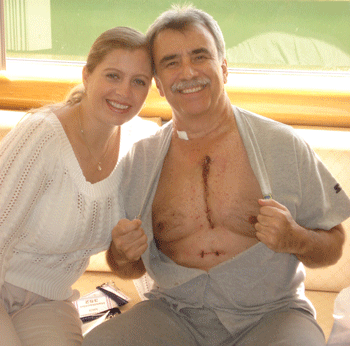
60 Minutes – Trasylol Exposed For Deadly Side Effects (Video)
By Adam Pick on March 2, 2008
One of my favorite television shows is 60 Minutes on CBS. I love the stories. I love the reporters. And, I love the way they tackle subjects that really make you think. (I even find Andy Rooney pretty darn funny.)
Yesterday, however, I was watching a very troubling 60 Minutes story about Trasylol. As you may know, Trasylol is a drug used during cardiac bypass surgery (including heart valve repair and heart valve replacement) to prevent blood clotting. The drug is manufactured by Bayer and its generic name is Aprotinin.
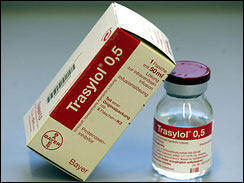
Guest Blog: Doug Atkins – Eight Days After Aortic Valve Replacement
By Adam Pick on March 1, 2008
Doug Atkins and his regurgitating bicuspid aortic valve appeared on my radar about three months ago. (To learn more about bicuspid valves, click here.)
I was eating sushi in Tokyo when I received an email from his wife, Heather. Like most caregivers, Heather peppered me with a series of questions about heart valve surgery. In fact, Heather ended her first email with, “Sorry for all the questions, but I am doing everything I can to keep my husband alive.”
Now, three months later, Doug is returning home from the hospital with a new set of heart valves. Like me, Doug opted for the Ross Procedure operation, a special form of aortic valve replacement. I received the following email from Doug – just eight days after Dr. William Ryan operated on him. I thought you might like to read it to gain further insight to the patient experience relative to heart valve surgery.
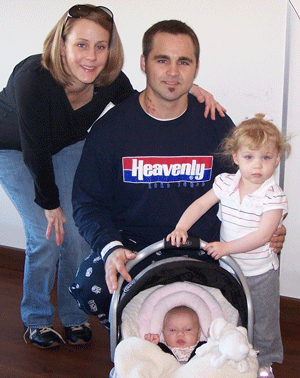
Heart Valve Manufacturing Tour at Edwards Lifesciences in Irvine, California
By Adam Pick on February 26, 2008
Hey everybody,
As you may know, I’m currently interviewing several leading heart valve replacement manufacturers for the next edition of my book. I’m trying to learn more facts about heart valve replacements to help future patients and caregivers better understand their options.
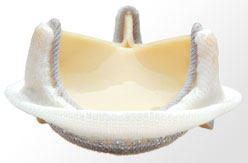
That said, last week I visited Edwards Lifesciences headquarters in Irvine, California. It was amazing! The company has an incredible heart valve museum that really illustrates the development of heart valve technology and heart valve surgery.
Our Own, Leslie Lafayette, Becomes A TV Star After Mitral Valve Repair (VIDEO)
By Adam Pick on February 25, 2008
As many of you have read in past blogs, Leslie Lafayette had mitral valve repair using the Da Vinci Surgical Robot a few weeks ago. Doctor Richard Shemin from UCLA was her cardiac surgeon.
While her surgery had some complications, Leslie’s great attitude is accelerating her recovery. Now… For the fun news!
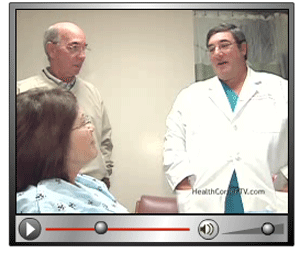
Leslie’s heart surgery story was documented by Lifetime Television. The story aired on Sunday, February 24th and has already been posted on the Internet.
Keep on tickin!
Adam
Miles Edwards’ First Mechanical Heart Valve Replacement
By Adam Pick on February 24, 2008
“What is that thing Adam is holding in his hand?” you may wondering.
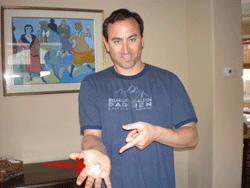
Well…
Believe it or not, that is a replica of the first mechanical heart valve developed by Miles “Lowell” Edwards in the late 1950’s.
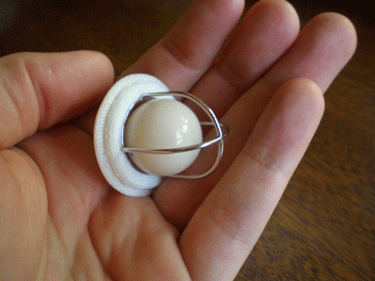
“Who was the first patient to receive the first Edwards’ caged-ball mechanical valve replacement?” you may also be wondering.
To find the answer to that question and much more, I highly encourage you to read the history of the Edwards LifeSciences and the first mechanical heart valve replacement surgery.
It’s amazing to think how far the heart valve manufacturers have advanced the performance and technology of mechanical valves and tissue valves.
Keep on tickin!
Adam
Happy Anniversary Raye! One Year After Heart Valve Replacement!
By Adam Pick on February 19, 2008
I wake up pretty early. Usually no later than 5:30am. Robyn (my wife) stays in bed while I make the coffee. A few minutes later, I’m in my office turning on my computer.
That is when my stitched heart really gets ticking. Why? Well, lately I have been receiving lots and lots and lots of email from folks like you – heart valve surgery patients and caregivers. Some emails are filled with fear. Some emails are filled with questions. Some emails are filled with frustration. And, some emails are filled with inspirational stories like this one…
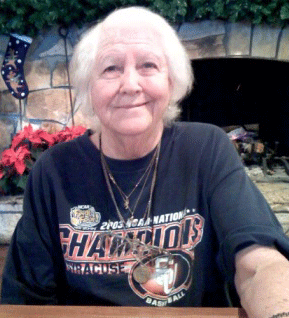
A few days ago, I received an email all about Raye Gilliamsen. Raye’s daughter, Abby, wrote me to share her mother’s story. Raye just celebrated her one year anniversary after receiving a new heart valve replacement.
True or False: After Heart Surgery, Patients Should Pre-Medicate Before Seeing The Dentist
By Adam Pick on February 16, 2008
Don’t be so quick to answer “true” to the above question.
Here’s why…
Until recently, it was recommended that patients with heart valve disorders receive short-term antibiotics prior to receiving dental treatment to prevent the risk of infective endocarditis (IE).
Now, however, the American Heart Association (AHA) has revised those guidelines. The AHA now suggests that many patients who have taken prophylactic antibiotics routinely in the past no longer need them.
But… Don’t be so quick to answer “false” to the statement above either.
Still, there are conflicting views on whether or not to pre-medicate for patients having had heart valve replacement or heart valve repair surgeries.
As you can read, during my most recent annual check-up (following my aortic valve replacement), Dr. Vaughn Starnes suggested I continue to pre-medicate with Amoxicillin prior to seeing my dentist.
It’s really no big deal. I’d rather be safe than sorry, right?
I thought you might want to know about this if you are going to need dental work and heart valve surgery in the future.
Keep on tickin!
Adam
“What About Mitral Valve Calcification?” Asks Kara
By Adam Pick on February 16, 2008
As many of you know, I had a congenital birth defect known as a bicuspid aortic valve. After thirty-three years of opening and closing, my two-cusp aortic valve became incredibly diseased with aortic stenosis and regurgitation. Ultimately, I had aortic valve replacement and pulmonary valve replacement. Following surgery, Dr. Vaughn Starnes (my surgeon) informed me that my aortic valve was very calcified as well.
That said, I just received an interesting question about mitral valve disease from Kara. Unlike most questions that focus on mitral valve prolapse and mitral valve regurgitation, this question focused on mitral valve calcification.
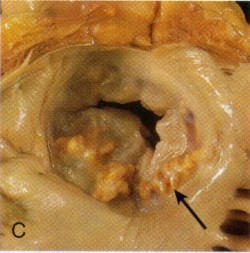
Kara’s question reads, “Can you tell me about mitral valve calcification? Do you have any pictures of a calcified mitral valve? What are the symptoms? What is the treatment of mitral valve calcification?”
As you can see above, calcification can impact mitral valves just as it can impact other heart valves. This picture illustrates the build-up of calcium along the annulus of the mitral valve. Ultimately, that impacts the integrity of the mitral valve to open and close properly. My research indicates that most symptoms of mitral valve calcification are similar to the symptoms of other forms of valve disease.
As for treatment of mitral valve calcification, that will be determined by your cardiologist and/or your surgeon. Primarily, there are two forms of surgical, mitral valve treatment – mitral valve replacement and mitral valve repair.
I hope that helps share some insight on mitral valve calcifcation.
Keep on tickin!
Adam
Multiple Choice Question: Waking Up With The Vent Tube Still In Is…
Written By: Adam Pick, Patient Advocate, Author & Website Founder
Page last updated: April 28, 2024
Heart Valve Surgery Pop Quiz Time!!!
Complete the following statement:
“Waking up in the intensive care unit after cardiac surgery with a ventilator tube still in your throat is…
- A. “So much fun! I can’t wait to do it again!”
- B. “Uncomfortable. Not being able to talk is somewhat dislocating.”
- C. “The worst thing ever!”
- D. “I don’t know! It was removed before I woke up.”
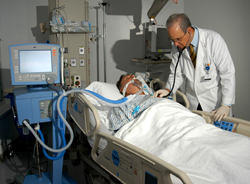
And… The answer is.. “E”… It depends!
Sergio And Maribel Are Off To Mexico City For Mitral Valve Replacement
By Adam Pick on February 14, 2008
Hola!
Over the past month, I have become friendly with Maribel and Sergio from Cancun, Mexico.
Sergio is the patient. At 54 years of age, his mitral valve needs to be replaced. Maribel, as you probably guessed, is his loving wife and caregiver.
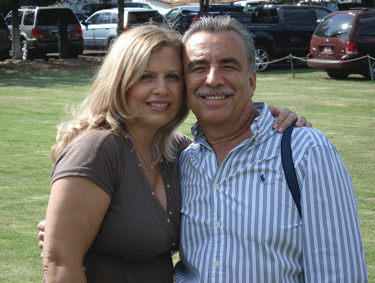
Today, Sergio and Maribel are leaving their home in Cancun for Mexico City. Sergio’s mitral valve replacement surgery is scheduled for this upcoming Monday. (To learn more about Sergio’s procedure, click here.)
As Maribel writes, “We are so nervous! You can imagine! But at the same time, your book was incredibly helpful because we feel prepared for the surgery. I hope the days go by rapidly. I just want to see the doctor getting out of the surgery and telling me everything is all right. That is my golden moment. I dream of that.”
With that thought in mind, here is to your ‘golden moment’ Maribel.
My prayers and thoughts are with you. Even though the surgery is on Monday, I am sending you great, big, healthy thoughts from Los Angeles right now! May Sergio’s surgery be completely uneventful! (Those are the best kinds of heart valve surgeries.)
Keep on tickin!
Adam
Your Questions Wanted For The 2008 Heart Valve Surgery Patient Survey!
By Adam Pick on February 13, 2008
Hi everybody,
As many of you know, I originally launched this website to help future patients and caregivers better understand the realities – the ups and downs – of heart valve surgery.
Now, two years later… It’s amazing to see what is happening in this community – as we gather to share our thoughts, feelings and fears about heart valve repair and heart valve replacement surgery. Global friendships are being made. Plus, among all things, patients are helping patients and caregivers are helping caregivers.

One of the most powerful tools we developed to learn more about the patient perspective was our 2007 Patient Heart Valve Surgery Survey. This unique survey of 78 patients, uncovered several interesting elements of the patient perspective that were not previously documented (at least in my research). For example, we learned a good deal about second opinions prior to heart surgery.
Guest Blog: Dr. Eric Roselli (The Cleveland Clinic) Comments On Reoperative Valve Surgery Due To Problematic Stitches
By Adam Pick on February 13, 2008
I recently received a great question from Jennifer (a caregiver) who is researching heart valve surgery options for her mother-in-law. Specifically, Jennifer wanted to know more about valve reoperations due to undone (loose) stitches around a replacement valve.
Jennifer’s question was pretty technical and I did not have an answer. So, I contacted Dr. Eric Roselli, a leading heart surgeon from The Cleveland Clinic, to get his perspective.

As you might imagine, Dr. Roselli had a thoughtful response to Jennifer’s question. That said, I thought you might like to read this patient case that was discussed via email earlier today.
Patient Background: In 1982, my mother-in-law (the patient) had her mitral valve replaced with a silastic heart ball valve (star Edwards no.4, model 6120, size 32mm) at Royal Prince Alfred Hospital in Sydney. Unfortunately, some of the stitches holding the valve in place seem to have torn away or come undone (according to her specialists), during the past 26 years.
Open Heart Surgery Diagram After Chest Incision And Sternotomy
By Adam Pick on February 12, 2008
Every few days, I see a picture or image on the Internet that REALLY captures my attention. Many times, those pictures are diagrams and illustrations that relate to heart valve surgery.
As I remember it, before my aortic valve replacement and pulmonary valve replacement surgery, I had a difficult time grasping what actually occurs during the operation.
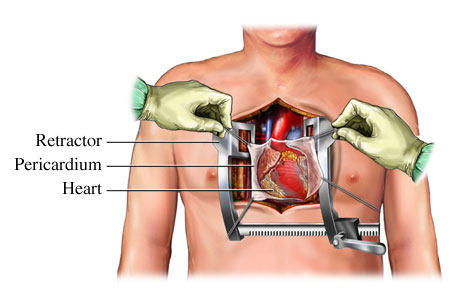
That said, I have included many pictures, drawings and images in this blog (and in my book) to help you better contemplate what occurs during the pre- and post-operative heart valve replacement or heart valve repair experience.
Your responses have so far been very positive. So, I am going to continue posting many more pictures – including human heart diagram, animated anatomy of heart functioning, mitral valve replacement diagram and more.
Above, you will see a very interesting diagram of the patient’s chest following the incision and median sternotomy – the sternum is already broken. As you can see, the surgeon now has full access to operate on the heart once the patient is placed on the heart-lung machine (bypass) if required. Then, the heart can be stopped, cooled and then fixed!
I hope you don’t think this is too gruesome. I found it educational and thought you might like to see an open heart surgery illustration of the chest during surgery. If you would prefer not to see stuff like this, please leave a reply below.
Keep on tickin!
Adam
Diagram of Mitral Valve Replacement With Mechanical Valve
By Adam Pick on February 1, 2008
I don’t know about you…
But when my first cardiologist, Dr. Bad Bedside Manner, told me that I needed open heart surgery due to my defective bicuspid aortic valve… I went into mini-shock.
Then, the stoic doctor, with the red nose, rapidly spewed a flurry of foreign words at me: calcification, leaflets, narrowing valve stenosis, regurgitation, normal ejection fraction, blah, blah, blah, blah.
“Enough medical mumbo-jumbo!” I remember thinking as Dr. Bad Bedside Manner continued to tell me that death was lurking in my future. “Please show me what you are talking about!”
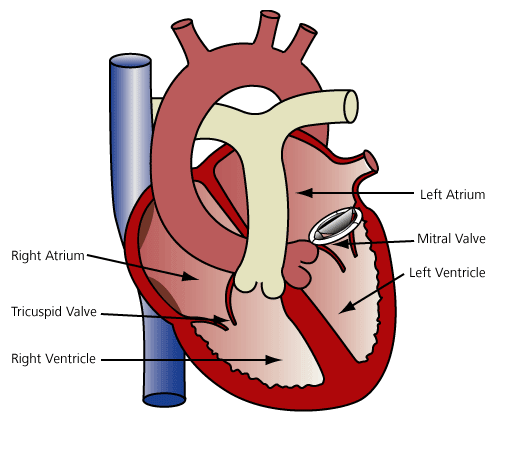
After A Mitral Valve Repair With Complications… Leslie Is Home!
By Adam Pick on January 31, 2008
Hey everybody,
Good news!
Leslie is home following her mitral valve repair. (You may remember a blog that featured Leslie as she was preparing for robotic mitral valve repair.)

After five days at UCLA Medical Center, Leslie has now entered the recovery phase of heart valve surgery. Below, you will find an interesting account of her surgery which was longer than most surgeries due to some cardiac surgery complications that were fixed during surgery. Great job Dr. Shemin! To learn more about Dr. Shemin, click here.
Here I Come Dr. Vaughn Starnes
By Adam Pick on January 29, 2008
After the annual check-up with Dr. Rosin (my cardiologist), it was time to venture back to USC’s Medical Center to see Dr. Vaughn Starnes (my heart surgeon), for part two of my annual check-up.
I have to admit…
The fact that Dr. Rosin was happy with my recent echocardiogram results made the sixty-minute drive to USC rather pleasant for a change. I can remember many, other drives to USC that were drenched in fear, anxiety and doubt due to my much-needed heart valve replacement surgery.
